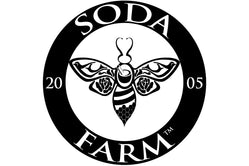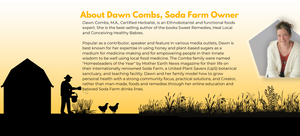The Dangers of Fake Sugar
Just this week I was speaking with a customer here at the farm and the topic of sweeteners came up. The Standard American Diet is focused on heavily reliant on the taste of sweet. At the same time, there is a campaign underway to vilify sugar. As a result, food companies have created a number of alternatives to sugar in a misguided attempt to suggest the illusion of diet and health food.
Ironically, it is much better to just eat real sugar in small amounts rather than all these substitutes. The substitutes are not only unhealthy, they can be downright dangerous for your health.
Stevia Is A Safe Sugar Substitute
Stevia: For many years now, stevia has seen widespread use in the United States as a sweetener. You can find it in many forms from tincture to powder. It is about 300 times sweeter than beet or cane sugar. In Japan, stevia corners about 47% of the sweetener market, but not in “leaf” form. They isolate only the compound called stevioside. Perhaps this type of use has encouraged us all to see stevia as merely a sugar substitute.
In fact, when stevia is consumed in its whole plant form there is much more to be had from this amazing plant. It has the ability to regulate blood sugar, both high and low. If your focus is on balanced hormones, the ability to replace chemical sugar substitutes and processed beet and cane sugar is an important one. We must keep in mind that insulin, after all, is a hormone. Hormonal imbalance can involve our adrenal glands, thyroid, and even our blood sugar levels.
Sadly, There Are Unsafe Substitutes
Truthfully, everyone should stay away from the chemical creations meant to fool our bodies into thinking we’re eating something sweet. Every last one of them have side effects that are not worth the chemical taste they add to food. While we have a problem in our society with a sweet tooth, it is much better to eat sugar than to reach for foods that are filled with these franken-sweeteners. If you wish to keep your blood sugar and hormones balanced, you should be eating sweets in moderation and definitely only those that contain maple syrup, raw honey, succanat or evaporated cane juice.
Aspartame (Sold around the world as NutraSweet, Equal, Spoonfuls, Canderel, Bienvia, NatraSweet and Miwon): “is a neurotoxic substance that has been associated with numerous health problems including dizziness, visual impairment, severe muscle aches, numbing of extremities, pancreatitis, high blood pressure, retinal hemorrhaging, seizures and depression. It is suspected of causing birth defects and chemical disruptions in the brain.” SOURCE
The FDA recommends that pregnant and lactating women, people with advanced liver disease and phenylketonurics avoid products containing aspartame due to concern over metabolizing phenylalanine. This metabolizes due to heat or prolonged storage and results in a known carcinogen.
Saccharin: found in numerous sodas and other processed foods. It is listed by name and is a neurotoxin and strong allergen. Those with sulfa allergies should be especially cautious.
Sucralose (Splenda): This chemical byproduct of chlorine and sugar has not been tested enough to show any kind of data on safety. The studies that have come forth indicate an ability to cause mutation. They also show a negative effect on diabetes and blood sugar levels. In laboratory settings it has been shown to cause damage to the thymus gland, liver and kidneys of rats.
Xylitol: I’ve had several members of my community trying to talk me into using xylitol. I’ve always been skeptical. This sugar substitute starts out innocently enough. It is advertised to be isolated from birch sap. I’m all for maple or birch syrup in cooking! Unfortunately, xylitol takes that syrup and hydrogenates it. This is a process that introduces dangerous metals into our food and I avoid it. The other consideration here is that birch sap gets pricey, so a good deal of xylitol is likely isolated from corn instead. More specifically, the cheapest corn, which is heavily polluted and genetically modified. I have seen the studies that claim that xylitol in gum can relieve ear congestion and infection. I would argue that it is the chewing action, not the xylitol itself, that is relieving pressure in the ear. As far as the prevention of cavities, I’d much rather have a cup of grass-fed bone broth!
Erythritol: Another sugar alcohol created by fermentation like xylitol. This variety is most often made from corn or wheat. Erythritol is put out in health food circles as another great sugar option because it contains no fructose, is low in calories and does not create any immediate blood sugar or insulin disturbances.
High Fructose Corn Syrup: So much time and attention has been put into the marketing campaigns that try to convince us that HFCS is the same as sugar… but it’s not.
The first strike against HFCS is that it is produced from corn, most of the supply here is genetically modified field corn. If that isn’t a line you draw for your family, the next disturbing bit about this unnatural sugar is how it is made. A study done in 2009 showed that the concentration of mercury found in HFCS as a result of processing was enough to warrant a warning on the amount of foods containing the sugary stuff that children can safely consume.
So what’s the big deal? High fructose corn syrup contains glucose and fructose and so does sugar… yes. The argument can be made that processed white sugar isn’t hugely different than HFCS. The problem with HFCS is found in the “unbound” fructose. If you are consuming sugar in its less processed form, or as part of fruits and vegetables, the fructose inside is bound to fiber and other vitamins and minerals. This means that the body must work hard enough to get it free. That time is precious because unbound fructose goes straight to the liver without hesitation. In fact, the HFCS content in the diet of most Americans is contributing to a new type of fatty liver and cirrhosis that does not involve alcohol. It is also leading to gout, high blood pressure, kidney disease, insulin resistance, obesity, high cholesterol, heart disease and leaky gut.



1 comment
THANK YOU!